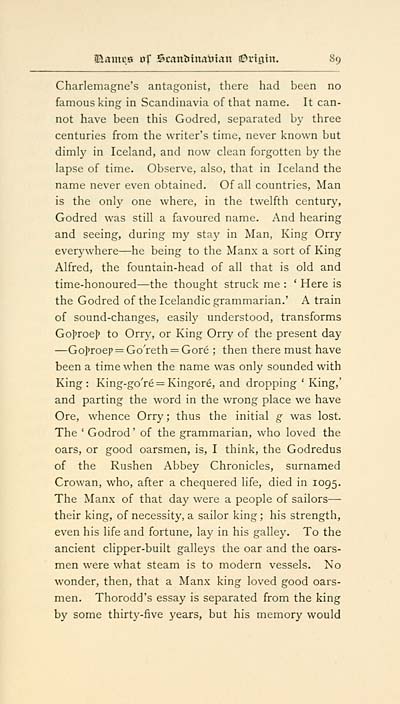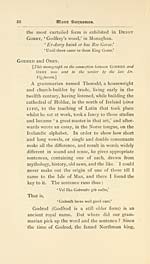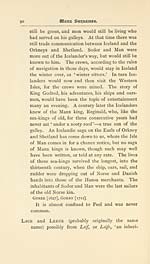Download files
Complete book:
Individual page:
Thumbnail gallery: Grid view | List view

Itami^a to^ i^canMna^uian aE>rl0m. 89
Charlemagne's antagonist, there had been no
famous king in Scandinavia of that name. It can-
not have been this Godred, separated by three
centuries from the writer's time, never known but
dimly in Iceland, and now clean forgotten by the
lapse of time. Observe, also, that in Iceland the
name never even obtained. Of all countries, Man
is the only one where, in the twelfth century,
Godred was still a favoured name. And hearing
and seeing, during my stay in Man, King Orry
everywhere — he being to the Manx a sort of King
Alfred, the fountain-head of all that is old and
time-honoured — the thought struck me : ' Here is
the Godred of the Icelandic grammarian.' A train
of sound-changes, easily understood, transforms
Gofroef to Orry, or King Orry of the present day
— Go]'roep = Go'reth = Gore ; then there must have
been a time when the name was only sounded with
King: King-go're = Kingore, and dropping ' King,'
and parting the word in the wrong place we have
Ore, whence Orry ; thus the initial g was lost.
The ' Godrod' of the grammarian, who loved the
oars, or good oarsmen, is, I think, the Godredus
of the Rushen Abbey Chronicles, surnamed
Crowan, who, after a chequered life, died in 1095.
The Manx of that day were a people of sailors —
their king, of necessity, a sailor king ; his strength,
even his life and fortune, lay in his galley. To the
ancient clipper-built galleys the oar and the oars-
men were what steam is to modern vessels. No
wonder, then, that a Manx king loved good oars-
men. Thorodd's essay is separated from the king
by some thirty-five years, but his memory would
Charlemagne's antagonist, there had been no
famous king in Scandinavia of that name. It can-
not have been this Godred, separated by three
centuries from the writer's time, never known but
dimly in Iceland, and now clean forgotten by the
lapse of time. Observe, also, that in Iceland the
name never even obtained. Of all countries, Man
is the only one where, in the twelfth century,
Godred was still a favoured name. And hearing
and seeing, during my stay in Man, King Orry
everywhere — he being to the Manx a sort of King
Alfred, the fountain-head of all that is old and
time-honoured — the thought struck me : ' Here is
the Godred of the Icelandic grammarian.' A train
of sound-changes, easily understood, transforms
Gofroef to Orry, or King Orry of the present day
— Go]'roep = Go'reth = Gore ; then there must have
been a time when the name was only sounded with
King: King-go're = Kingore, and dropping ' King,'
and parting the word in the wrong place we have
Ore, whence Orry ; thus the initial g was lost.
The ' Godrod' of the grammarian, who loved the
oars, or good oarsmen, is, I think, the Godredus
of the Rushen Abbey Chronicles, surnamed
Crowan, who, after a chequered life, died in 1095.
The Manx of that day were a people of sailors —
their king, of necessity, a sailor king ; his strength,
even his life and fortune, lay in his galley. To the
ancient clipper-built galleys the oar and the oars-
men were what steam is to modern vessels. No
wonder, then, that a Manx king loved good oars-
men. Thorodd's essay is separated from the king
by some thirty-five years, but his memory would
Set display mode to: Large image | Transcription
Images and transcriptions on this page, including medium image downloads, may be used under the Creative Commons Attribution 4.0 International Licence unless otherwise stated. ![]()
| Early Gaelic Book Collections > Blair Collection > Surnames & place-names of the Isle of Man > (107) |
|---|
| Permanent URL | https://digital.nls.uk/82100932 |
|---|
| Description | A selection of books from a collection of more than 500 titles, mostly on religious and literary topics. Also includes some material dealing with other Celtic languages and societies. Collection created towards the end of the 19th century by Lady Evelyn Stewart Murray. |
|---|
| Description | Selected items from five 'Special and Named Printed Collections'. Includes books in Gaelic and other Celtic languages, works about the Gaels, their languages, literature, culture and history. |
|---|

